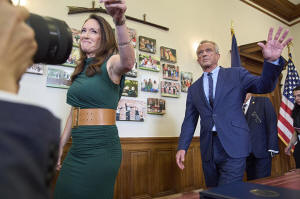Kennedy's new CDC panel includes members who have criticized vaccines
and spread misinformation
[June 12, 2025]
By MIKE STOBBE
NEW YORK (AP) — U.S. Health Secretary Robert F. Kennedy Jr. on Wednesday
named eight new vaccine policy advisers to replace the panel that he
abruptly dismissed earlier this week.
They include a scientist who researched mRNA vaccine technology and
became a conservative darling for his criticisms of COVID-19 vaccines, a
leading critic of pandemic-era lockdowns, and a professor of operations
management.
Kennedy's decision to “retire” the previous 17-member Advisory Committee
on Immunization Practices was widely decried by doctors' groups and
public health organizations, who feared the advisers would be replaced
by a group aligned with Kennedy's desire to reassess — and possibly end
— longstanding vaccination recommendations.
On Tuesday, before he announced his picks, Kennedy said: “We’re going to
bring great people onto the ACIP panel – not anti-vaxxers – bringing
people on who are credentialed scientists.”
The new appointees include Vicky Pebsworth, a regional director for the
National Association of Catholic Nurses, who has been listed as a board
member and volunteer director for the National Vaccine Information
Center, a group that is widely considered to be a leading source of
vaccine misinformation.
Another is Dr. Robert Malone, the former mRNA researcher who emerged as
a close adviser to Kennedy during the measles outbreak. Malone, who runs
a wellness institute and a popular blog, rose to prominence during the
COVID-19 pandemic as he relayed conspiracy theories around the outbreak
and the vaccines that followed. He has appeared on podcasts and other
conservative news outlets where he’s promoted unproven and alternative
treatments for measles and COVID-19.
He has claimed that millions of Americans were hypnotized into taking
the COVID-19 shots and has suggested that those vaccines cause a form of
AIDS. He’s downplayed deaths related to one of the largest measles
outbreaks in the U.S. in years.

Other appointees include Dr. Martin Kulldorff, a biostatistician and
epidemiologist who was a co-author of the Great Barrington Declaration,
an October 2020 letter maintaining that pandemic shutdowns were causing
irreparable harm. Dr. Cody Meissner, a former ACIP member, also was
named.
Abram Wagner of the University of Michigan’s school of public health,
who investigates vaccination programs, said he’s not satisfied with the
composition of the committee.
“The previous ACIP was made up of technical experts who have spent their
lives studying vaccines,” he said. Most people on the current list
“don’t have the technical capacity that we would expect out of people
who would have to make really complicated decisions involving
interpreting complicated scientific data.”
He said having Pebsworth on the board is “incredibly problematic” since
she is involved in an organization that “distributes a lot of
misinformation.”
Kennedy made the announcement in a social media post on Wednesday.
The committee, created in 1964, makes recommendations to the director of
the Centers for Disease Control and Prevention. CDC directors almost
always approve those recommendations on how vaccines that have been
approved by the Food and Drug Administration should be used. The CDC’s
final recommendations are widely heeded by doctors and guide vaccination
programs.
The other appointees are:
—Dr. James Hibbeln, who formerly headed a National Institutes of Health
group focused on nutritional neurosciences and who studies how nutrition
affects the brain, including the potential benefits of seafood
consumption during pregnancy.
—Retsef Levi, a professor of operations management at the Massachusetts
Institute of Technology who studies business issues related to supply
chain, logistics, pricing optimization and health and health care
management. In a 2023 video pinned to an X profile under his name, Levi
called for the end of the COVID-19 vaccination program, claiming the
vaccines were ineffective and dangerous despite evidence they saved
millions of lives.
—Dr. James Pagano, an emergency medicine physician from Los Angeles.
—Dr. Michael Ross, a Virginia-based obstetrician and gynecologist.

[to top of second column]
|

Secretary of Agriculture Brooke Rollins, left, and Secretary of
Health and Human Services Robert F. Kennedy Jr., wave as they leave
an event about the Make America Healthy Again (MAHA) program and
SNAP choice changes, Tuesday, June 10, 2025, at the USDA Whitten
Building, in Washington. (AP Photo/Jacquelyn Martin)
 Of the eight named by Kennedy,
perhaps the most experienced in vaccine policy is Meissner, an
expert in pediatric infectious diseases at Dartmouth-Hitchcock
Medical Center, who has previously served as a member of both ACIP
and the Food and Drug Administration’s vaccine advisory panel.
During his five-year term as an FDA adviser, the committee was
repeatedly asked to review and vote on the safety and effectiveness
of COVID-19 vaccines that were rapidly developed to fight the
pandemic. In September 2021, he joined the majority of panelists who
voted against a plan from the Biden administration to offer an extra
vaccine dose to all American adults. The panel instead recommended
that the extra shot should be limited to seniors and those at higher
risk of the disease.
Ultimately, the FDA disregarded the panel’s recommendation and OK’d
an extra vaccine dose for all adults.
In addition to serving on government panels, Meissner has helped
author policy statements and vaccination schedules for the American
Academy of Pediatrics.
ACIP members typically serve in staggered four-year terms, although
several appointments were delayed during the Biden administration
before positions were filled last year. The voting members all have
scientific or clinical expertise in immunization, except for one
“consumer representative” who can bring perspective on community and
social facets of vaccine programs.
Kennedy, a leading voice in the anti-vaccine movement before
becoming the U.S. government’s top health official, has accused the
committee of being too closely aligned with vaccine manufacturers
and of rubber-stamping vaccines. ACIP policies require members to
state past collaborations with vaccine companies and to recuse
themselves from votes in which they had a conflict of interest, but
Kennedy has dismissed those safeguards as weak.
Most of the people who best understand vaccines are those who have
researched them, which usually requires some degree of collaboration
with the companies that develop and sell them, said Jason Schwartz,
a Yale University health policy researcher.
“If you are to exclude any reputable, respected vaccine expert who
has ever engaged even in a limited way with the vaccine industry,
you’re likely to have a very small pool of folks to draw from,”
Schwartz said.

The U.S. Senate confirmed Kennedy in February after he promised he
would not change the vaccination schedule. But less than a week
later, he vowed to investigate childhood vaccines that prevent
measles, polio and other dangerous diseases.
Kennedy has ignored some of the recommendations ACIP voted for in
April, including the endorsement of a new combination shot that
protects against five strains of meningococcal bacteria and the
expansion of vaccinations against RSV.
In late May, Kennedy disregarded the committee and announced the
government would change the recommendation for children and pregnant
women to get COVID-19 shots.
On Monday, Kennedy ousted all 17 members of the ACIP, saying he
would appoint a new group before the next scheduled meeting in late
June. The agenda for that meeting has not yet been posted, but a
recent federal notice said votes are expected on vaccinations
against flu, COVID-19, HPV, RSV and meningococcal bacteria.
A HHS spokesman did not respond to a question about whether there
would be only eight ACIP members, or whether more will be named
later.
___
Associated Press reporters Matthew Perrone, Amanda Seitz, Devi
Shastri and Laura Ungar contributed to this report.
All contents © copyright 2025 Associated Press. All rights reserved |